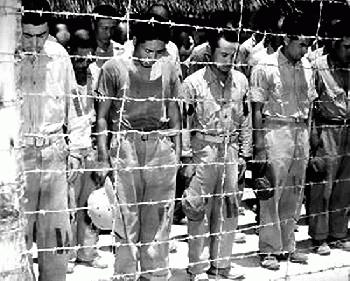
They marched in very high temperatures and conditions, and were treated harshly by Japanese soldiers. Many soldiers became ill because of the scorching heat. There were forms of "sun torture", where marchers were forced to strip naked, face the scorching heat, and have a water source in front of them. The marchers were given almost no water and food. The Japanese soldiers starved and beat the marchers and killed any marchers who were too weak to keep going.
The soldiers were split into groups of 100, and it normally took five days to complete. The exact death toll is unknown, but thousands of Americans died on the march. With may of the marching groups was a "clean up squad" that would take care of the exhausted bodies by killing them. Afterwards, the soldiers were put on a train to the prisoner-of-war camps, where diseases spread. After the prisoners-of-war were released, they blamed General Masaharu Homma, who was reported for war crimes, he was executed after the war.

"A Japanese soldier took my canteen, gave the water to a horse, and threw the canteen away," reported one escapee. "The stronger were not permitted to help the weaker. We then would hear shots behind us." The Japanese forced the prisoners to sit for hours in the hot sun without water. "Many of us went crazy and several died."
There are still many war memorials of the march, and the Japanese have apologized many times after the war.
Sources:
http://www.history.com/topics/world-war-ii/bataan-death-march
http://www.eyewitnesstohistory.com/bataandeathmarch.htm
http://www.pbs.org/wgbh/amex/macarthur/sfeature/bataan_capture.html
This is a very interesting post! You went in depth on a subject that was covered lightly in the documentary we watched, but also looked at the varying viewpoints. Although this was a very harsh event with severe consequences, we cannot put all the blame on the Japanese as this was an act of war and during these times extreme measures were often taken. Nevertheless, this was a horrifying event which many hope won't happen again.
ReplyDeleteThis is very engaging and was something I wanted to know more about ! Its very upsetting to see this happen like the post above ^^ they make a good point not all the blame should be put on the Japanese because it was in times of war and people seem not to think but just follow orders this relates to the American civil war and the US in general in times of war all civil human rights are stripped away from people and seemed not cared about. Were there any Japanese soldier who seemed to be against this treatment of the prisoners of war? Why weren't supplies sent to the American soldiers fighting on the Island that would of stopped this incident from happening ?
ReplyDeleteIt's really interesting to learn about how the march was organized, but at the same sad to know how the soldiers were treated. After researching more about this topic, I found that there are actually similar memorial marches today, also in Bataan, to honor the soldiers to fought in the Philippines: http://bataanmarch.com/ The marchers are actually required to carry heavy backpacks to imitate the heavy weights that the soldiers were required to carry. I think it is a really good way to remember the sacrifices the soldiers made.
ReplyDeleteThank you for shining light on this dark topic. It's quite saddening to see how war forces countries to act and punish in this way. The Japanese, as you said, issued an apology for the Bataan Death March. However, the U.S. also did another horrible (in the sense of death and destruction) act during the war: the atomic bombings of Hiroshima and Nagasaki. The U.S. has not formally apologized for them, which some believe is shameful while others agree with the decision. Why hasn't the U.S. apologized for the bombings? To learn more, go to: https://www.theatlantic.com/international/archive/2016/05/obama-hiroshima-apology-nuclear/483617/
ReplyDelete